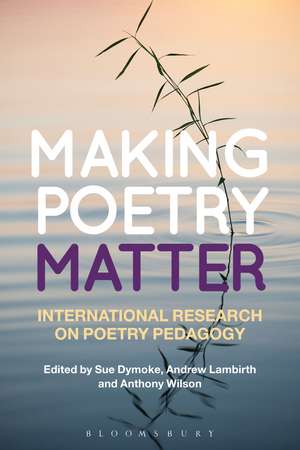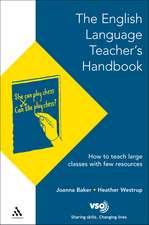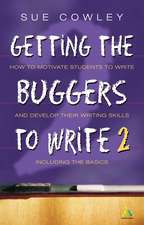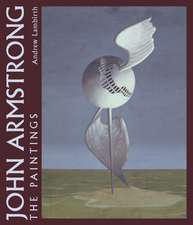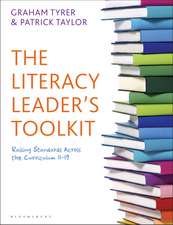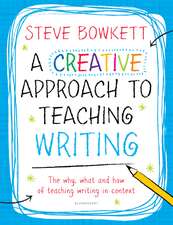Making Poetry Matter: International Research on Poetry Pedagogy
Editat de Dr Sue Dymoke, Dr Andrew Lambirth, Dr Anthony Wilsonen Limba Engleză Paperback – 28 ian 2015
| Toate formatele și edițiile | Preț | Express |
|---|---|---|
| Paperback (1) | 250.94 lei 3-5 săpt. | |
| Bloomsbury Publishing – 28 ian 2015 | 250.94 lei 3-5 săpt. | |
| Hardback (1) | 1007.62 lei 6-8 săpt. | |
| Bloomsbury Publishing – 5 iun 2013 | 1007.62 lei 6-8 săpt. |
Preț: 250.94 lei
Preț vechi: 288.41 lei
-13% Nou
Puncte Express: 376
Preț estimativ în valută:
48.02€ • 52.15$ • 40.34£
48.02€ • 52.15$ • 40.34£
Carte disponibilă
Livrare economică 01-15 aprilie
Preluare comenzi: 021 569.72.76
Specificații
ISBN-13: 9781472515056
ISBN-10: 1472515056
Pagini: 240
Dimensiuni: 156 x 234 x 15 mm
Greutate: 0.36 kg
Editura: Bloomsbury Publishing
Colecția Bloomsbury Academic
Locul publicării:London, United Kingdom
ISBN-10: 1472515056
Pagini: 240
Dimensiuni: 156 x 234 x 15 mm
Greutate: 0.36 kg
Editura: Bloomsbury Publishing
Colecția Bloomsbury Academic
Locul publicării:London, United Kingdom
Caracteristici
Provides new insights from cutting edge research in an under-reported field
Notă biografică
Sue Dymoke is Reader in Education and Secondary PGCE Course Leader in the School of Education at the University of Leicester, UK.Andrew Lambirth is Professor of Education in the Faculty of Education and Health at the University of Greenwich, UK.Anthony Wilson is Senior Lecturer in the Graduate School of Education at the University of Exeter, UK, where he is Subject Leader for PCGE Primary English.
Cuprins
AcknowledgementsPublisher's AcknowledgementsList of FiguresList of Tables About the Contributors1. Introduction, Sue Dymoke (University of Leicester, UK), Andrew Lambirth (University of Greenwich, UK) and Anthony Wilson (University of Exeter, UK)Part I: Reading Poetry2. Exploring Teachers' Positions and Practices, Teresa Cremin (Open University, UK)3. Primary Student Teachers' Attitudes Towards Poetry and Poetry Teaching, Fiona Collins (Roehampton University, UK) and Alison Kelly (Roehampton University, UK)4. Exploring Resistance to Poetry in Advanced English Studies, Gary Snapper (Brunel University, UK, and Cheney School, Oxford, UK)5. Commentary: Confidence and Resilience in Poetry Teaching, David Whitely (University of Cambridge, UK)Part II: Writing Poetry6. Students' Metalinguistic Understanding of Poetry Writing, Debra Myhill (University of Exeter, UK)7. Teachers' Metaphors of Teaching Poetry Writing, Anthony Wilson (University of Exeter, UK)8. Ecocritical Approaches to Writing Nature Poetry, Sasha Matthewman (University of Bristol, UK)9. Responding to Children's Poetry, Andrew Lambirth (University of Greenwich, UK), Sarah Smith (University of Greenwich, UK) and Susanna Steele (University of Greenwich, UK)10. Commentary: Writing Poetry, Teaching Poetry, Jane Spiro (Oxford Brookes University, UK)Part III: Speaking Poetry and Listening to Poetry11. Preadolescents Writing and Performing Poetry, Janine L. Certo (Michigan State University, USA)12. Hearing the Voice of Poetry, Joy Alexander (Queen's University, Belfast, UK)13: Heard Poetry and Oral Response, John Gordon (University of East Anglia, UK)14. Commentary: Poetry as a Matter of Spokenness, Julie Blake (Poetry Archive, UK)Part IV: Transformative Poetry Cultures15. Developing Poetry Pedagogy for EAL Learners within Inclusive Intercultural Practices, Vicky Obied (Goldsmiths, University of London, UK)16. Teaching Poetry in New Zealand Secondary Schools at a Time of Curriculum Change, Sue Dymoke (University of Leicester, UK)17. Digital Poetry, Power and Social Justice, Janette Hughes (University of Ontario Institute of Technology, Canada)18. Commentary: Poetry, Culture and Identity, Andrey Rosowsky (University of Sheffield, UK)19. Afterword, Myra Barrs (Centre for Literacy in Primary Education, UK) with Morag Styles (University of Cambridge, UK)NotesIndex
Recenzii
A timely and much needed collection of research essays which probe the current teaching of poetry at all stages of schooling.
Both [this book and Making Poetry Happen] offer reassuring and affirming accounts of the innate power of poetry as a means of expressing identity and individuality in the classroom. ... [They] replace fears and anxieties with practical strategies and evidence of how creative and shared approaches to poetry can empower students within the classroom environment and beyond.
This rich and invigorating book provides a much-needed argument for the place of poetry in 21st century English curriculum, and a grounded and practical resource for reading, teaching, writing, analysing, performing and making poetry. Bringing together academics, practicing poets and classroom teachers, it offers a set of nuanced and wide ranging reflections on the pragmatics and possibilities of teaching poetry and timely and sensitive instances of good pedagogy and responsive teaching in current times. It will be warmly welcomed by English and literacy teachers, academics and the profession alike. Most importantly, it provides real opportunities to make a difference; to enhance and open up the experience of literature in young people's lives.
Both [this book and Making Poetry Happen] offer reassuring and affirming accounts of the innate power of poetry as a means of expressing identity and individuality in the classroom. ... [They] replace fears and anxieties with practical strategies and evidence of how creative and shared approaches to poetry can empower students within the classroom environment and beyond.
This rich and invigorating book provides a much-needed argument for the place of poetry in 21st century English curriculum, and a grounded and practical resource for reading, teaching, writing, analysing, performing and making poetry. Bringing together academics, practicing poets and classroom teachers, it offers a set of nuanced and wide ranging reflections on the pragmatics and possibilities of teaching poetry and timely and sensitive instances of good pedagogy and responsive teaching in current times. It will be warmly welcomed by English and literacy teachers, academics and the profession alike. Most importantly, it provides real opportunities to make a difference; to enhance and open up the experience of literature in young people's lives.
